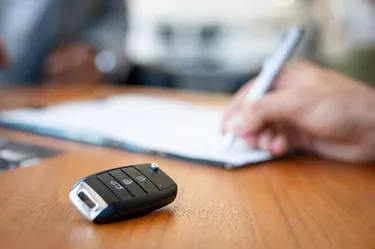
If you and your ex-spouse applied together for a car loan, you're both legally liable for making the payments. Your divorce, and the subsequent divorce decree, does not absolve your joint obligation to your lender. As long as the account remains in both names, any payments made will appear on both credit reports, and the lender retains the legal right to pursue both of you for missed payments.
Because removing your ex-spouse's name from your car loan may prove difficult, doing so prior to divorce is preferable to waiting until the divorce is final. If your divorce has already been finalized, however, you still have some options for removing your ex-spouse from your vehicle's loan paperwork.
Video of the Day
Video of the Day
Request Novation of the Loan
Novation of the loan may be possible. Contact your lender and request novation of the loan. Through novation the bank agrees to modify the terms of your original contract. Request that the car loan be transferred into your name only. Your lender will request that you submit copies of various financial documents proving that you can afford the monthly payments on your own.
You will also need to submit a copy of the divorce decree granting you full ownership of the vehicle. The exact documentation necessary for novation of the loan will vary depending on the lender.
It is advantageous to your lender to have the vehicle loan remain in both your name and your ex-spouses, since it can legally pursue either of you in the event you default on the payments. Because of this, not all banks will agree to modify your loan terms.
Refinance Into Your Name Only
To remove you're ex-spouse's name, you'll need to refinance the vehicle. By refinancing the car, you are taking out a new loan to pay off the current loan. Provided you take out the new loan on your own, your ex-spouse's name will no longer appear within the loan paperwork, and you will take over full responsibility for making payments. Refinancing is only possible if the value of the car exceeds the amount you still owe on the current loan, says Cars Direct.
It is important to note that refinancing the original car loan will result in a new interest rate that may be higher than the one currently present on the vehicle. This, in turn, can result in higher monthly payments. In most states, your ex-spouse must agree before you can refinance the vehicle into your name only. Affordable Family Lawyer also points out that a judge will not order a refinance unless you are able to prove you can afford it.
Secure a Personal Loan
You may need to take out a personal loan to pay off the car if you owe more on the vehicle than it is currently worth. Unlike a refinance loan, a personal loan isn't tied directly to the vehicle. Thus, the vehicle's value isn't a factor in determining whether or not you qualify. Personal loans typically carry stricter credit and income requirements than refinance loans.
If you don't qualify for a personal loan, yet you own a home with equity, consider applying for a home equity loan and using the loan to pay off the vehicle.